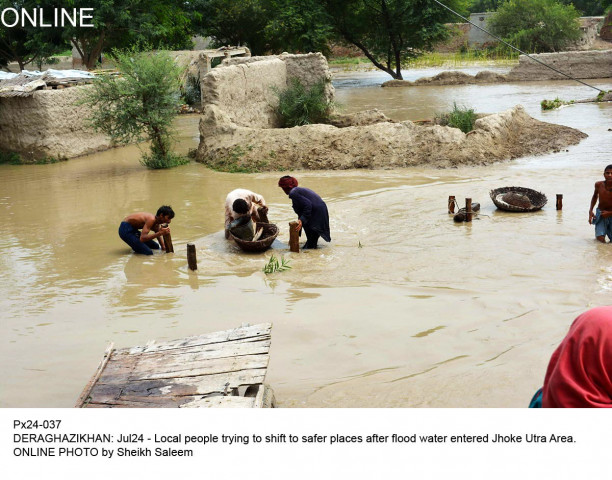Dealing with floods
We need to ask ourselves what various bodies set up to manage flooding are doing, why they have not proved effective

Men try to fish for their belongings after flood water inundated their home. PHOTO: ONLINE
In Punjab, the district of DG Khan has been inundated by floodwater, with the chief minister demanding an inquiry into why the situation was allowed to get out of hand and why a key embankment was not built in time. Flooding has been reported at the Chashma Barrage and floods are also moving downstream into Sindh where districts such as Ghotki have already been affected and attempts are being made to move people to safer areas.
Flooding is not a new phenomenon. It has hit the country year after year, notably since 2010, with thousands affected by it. The fact that we are still only entering the monsoon season is rather terrifying. It means there could be worse flooding over the days to come, especially in Sindh, where there has been a forecast of heavy rains. While rains cannot be stopped or the effects of climate change, said to be responsible for some of the damage, reversed immediately, the reality is we can do a great deal to prevent the suffering of the people. This is precisely the reason why bodies such as the National Disaster Management Authority were set up after the 2005 earthquake with provincial wings assigned to carry out necessary work in provinces. International organisations such as Oxfam have also pointed out that Pakistan needs to be better prepared for disasters and that this readiness could greatly help avoid the situation we see today, with thousands of people facing the adverse impact of a natural calamity. We need to ask ourselves what the various bodies set up to manage flooding and other calamities are doing and why they have not proved effective in tackling the kind of problems we see today.
Published in The Express Tribune, July 25th, 2015.
Like Opinion & Editorial on Facebook, follow @ETOpEd on Twitter to receive all updates on all our daily pieces.














COMMENTS
Comments are moderated and generally will be posted if they are on-topic and not abusive.
For more information, please see our Comments FAQ